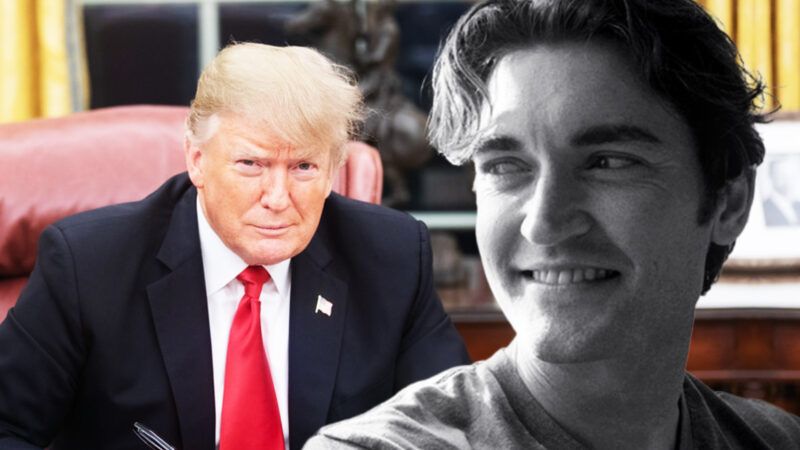President Donald Trump Pardons Silk Road Founder Ross Ulbricht
Fulfilling a campaign promise to libertarians and the bitcoin community, the Silk Road founder's life sentence without parole is now over.

President Donald Trump, fulfilling a promise made at the Libertarian Party's National Convention in May, pardoned Ross Ulbricht today. Ulbricht had been serving a life sentence for his role in founding and operating the dark web marketplace Silk Road.
As Trump put it in a Truth Social post: "in honor of [his mother Lyn Ulbricht], and the Libertarian Movement, which supported me so strongly, it was my pleasure to have just signed a full and unconditional pardon of her son, Ross." He said "the scum that worked to convict him were some of the same lunatics who were involved in the modern-day weaponization of government against me."
As I reported on his sentencing in May 2015 (he has been in prison since his October 2013 arrest):
Ross Ulbricht was sentenced to life in prison with no parole…by Judge Katherine Forrest in U.S. District Court for the southern district of New York. Ulbricht was convicted back in February on seven charges, all related to the operation of the darkwebsite called Silk Road, which used Tor-enabled anonymity and the cryptocurrency bitcoin to allow people to buy and sell often illegal items in safety and security, with the site providing an escrow service between buyer and seller to ensure both were satisfied.
Ulbricht was a clever entrepreneur, enthralled by libertarian ideas derived from the likes of Murray Rothbard and Samuel Konkin about the richness and justice of truly free markets not hobbled by government threats.
The charges were: "narcotics trafficking; distribution of narcotics by means of the Internet; narcotics trafficking conspiracy; continuing criminal enterprise; conspiracy to aid and abet computer hacking; conspiracy to traffic in fraudulent identity documents; and money laundering conspiracy."
None of the charges were related to either personally selling an illegal substance to anyone—Ulbricht merely ran a website that facilitated it—and none were related to causing direct harm to anyone's life or property.
Given the amazing water-muddying the prosecution achieved by talking about, but never trying Ulbricht for or proving in court beyond a reasonable doubt, allegedly planned, but never executed, murders for hire, one wonders whether the judge allowed any thoughts of those rumors, even subconsciously, to shape her sentencing decision.
Silk Road's innovative mail order using bitcoin, combined with user reviews of sellers, imposed some real market discipline on dealers, kept buyers from the occasional dangers of physically obtaining drugs, and allowed people not violating others' lives and property to buy and sell drugs with less (but not zero) legal risk.
Because of all that, and the site's role in publicizing and popularizing the use of bitcoin as currency, Ulbricht was considered a martyr of sorts to many in the libertarian and bitcoin communities.
Trump's promise, out of character for a man who otherwise advocates the death penalty for drug dealing, was widely seen as an attempt to appeal to those parts of the larger anti-establishment coalition he put together on his way to his return to the White House.
Ulbricht has expressed regret and his intention to be a law-abiding citizen, and there is certainly little reason to think he'd ever represent any danger to others on release. Reason's Nick Gillespie and Jacob Sullum have, in the past week, provided detailed discussions about why letting Ulbricht out after serving 11 years is proper and just.
As I wrote upon his sentencing, Ulbricht need not "worry about redemption per se. Ulbricht and Silk Road….sent out a more powerful message than the one the government wanted Judge [Katherine] Forrest to send: that ingenuity and technology and effort can create wonderfully helpful realms of freedom in markets and behavior."
The Libertarian Party Connection
Despite facing criticism for her support of Trump—and for the L.P.'s falling fortunes in membership, money, and candidates—Angela McArdle, chair of the Libertarian National Committee, argued for Libertarian support for Trump in large part based on his promise of Ulbricht's release, or at least because he was the type of major party candidate who would release him. While she has at different times intimated that her cooperation with Trump induced him to make the promise, and also that, as she told Tom Woods on his podcast in June 2024, Trump in fact already signed a pardon for Ulbricht in 2020 but was somehow foiled by underlings, the pardon does indicate that Trump considers a libertarian constituency one he is behooved to do favors for, which is an encouraging sign that he can feel pressured to sometimes do the right thing in libertarian terms.
While many doubted Trump would come through, Ulbricht himself seemed confident it would happen, as he expressed in a November post-election X post. McArdle also insisted in a November interview with Reason's Robby Soave on The Hill's Rising program that she'd arranged meetings between Trump's people and Ulbricht's family about the matter. McArdle repeated her confidence that Trump would make good on his vow last week.
One just favor for libertarians does not a libertarian administration make, especially not one so dedicated to hobbling free trade, punishing the press, rounding up peaceful immigrants, and pursuing autarkist nationalist industrial policy. But Trump's coming through on this promise makes a huge difference for one man who did not deserve to spend the rest of his life in prison, and deserves justified applause.


Show Comments (142)